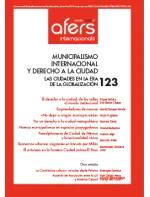Towards a right to the metropolitan city: an institutional analysis

Metropolitan areas have become the battleground for human rights, particularly the “right to the city”. The New Urban Agenda (NUA) recognises this principle as an ideal way to build a city for all. The Sustainable Development Goals (SDGs) present a sustainable (also urban) development model with multiple economic, social and environmental aspects. How does the metropolitan institutional framework influence the implementation of the SDGs? Do the necessary resources and competencies exist to meet the ideal expressed in the NUA? Using examples from all continents, the paper examines the extent to which actions and objectives aimed at sustainable urban development take a metropolitan approach and how institutional variables (i. e. metropolitan governance, fragmentation, degree of decentralisation and local autonomy, and role of the state) enhance or jeopardise these processes.
Keywords: metropolitan areas, New Urban Agenda, governance, right to the city, Sustainable Development Goals, institutions
DOI: doi.org/10.24241/rcai.2019.123.3.69
>> The full text articles of this issue are available only in Spanish language
How to cite this article: Tomàs Fornés, Mariona. «Por un derecho a la ciudad metropolitana: un análisis institucional». Revista CIDOB d’Afers Internacionals, n.º 123 (diciembre de 2019), p. 69-91. DOI: doi.org/10.24241/rcai.2019.123.3.69